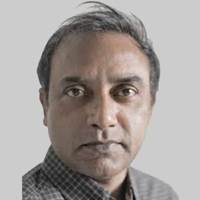Bangladesh’s Chief Adviser Muhammad Yunus has squandered his public goodwill due to an unrelenting pursuit of power, journalist and writer Monjurul Haque has asserted.
Yunus assumed leadership with specific objectives but has since entangled himself in a web of geopolitical commitments that threaten his legacy and Bangladesh’s sovereignty, he said in a discussion on a Monday talk show.
Monjurul Haque alleged that Yunus made assurances to the United States to establish a military base in a strategic buffer zone—potentially in Teknaf, Saint Martin’s Island, Shilkhali, or Cox’s Bazar—and to transfer management of Chittagong Port to a multinational corporation.
While outsourcing port operations to foreign entities is not uncommon in East Asia and beyond, Monjurul Haque dismissed Yunus’s vision as unrealistic.
“Yunus claims our workers will learn port management from foreign operators and secure jobs abroad, generating substantial remittances,” he remarked. “This is an implausible fantasy, a pretext for decisions that serve external interests.”

Monjurul Haque emphasized Bangladesh’s economic constraints, noting that while the country excels in exporting ready-made garments and rawhide, it lacks the capacity to export rice, jute, tea, or IT services sustainably.
“The notion that in a decade our workers will master port operations and secure lucrative foreign contracts is a hollow promise,” he said.
Instead of vague assurances, he suggested Yunus could have been transparent about his commitments, proposing that Bangladesh learn port management from nations like South Korea, Oman, or Kuwait without ceding control of Chittagong Port.
The journalist drew a historical parallel to the East India Company, which began with a modest request to anchor ships and ultimately colonized India for two centuries. “This is the pattern of imperialist agendas,” he warned.
“If we allow a multinational to manage our port, foreign military presence—whether US Marines or Air Force—could follow, with profound consequences for our sovereignty.”
Monjurul Haque further cautioned against the social and cultural ramifications, referencing the Philippines’ experience with foreign military bases, which he claimed led to social exploitation and moral decay. “Are we prepared to trade our dignity for financial aid?” he asked pointedly.
Delving into the shadowy dynamics of geopolitics, he described how operatives who fail in their assignments are often abandoned or eliminated by their sponsors.
He portrayed Yunus as caught in a perilous bind, unable to fulfill his alleged commitments to foreign powers while facing domestic opposition from groups like Jamaat-e-Islami and the NCP (National Citizen Party).
“Yunus has fallen into a quagmire from which escape is impossible,” Monjurul Haque added. “He cannot simply retreat to Paris for a quiet life; his political adversaries and foreign backers will not allow it.”
Yunus’s failure to form a national unity government, compounded by resistance from Islamist factions, has left him politically isolated. “He has closed every avenue for retreat. Had he held elections within three months, inclusive of all parties, including the Awami League, he could have earned enduring respect as a unifying leader. Instead, his ambition has eroded his credibility.”
Reflecting on Yunus’s tenure, Monjurul Haque lamented that his 10 months in power have been marked by missed opportunities.
“His popularity has plummeted, and no one trusts his promises anymore,” he said. “Even the smallest political factions now challenge his every move. By inviting external powers to influence our affairs, Yunus has summoned forces that may ultimately destroy him.”
The journalist concluded with a stark metaphor: “When you invite a malevolent force, it will claim a price before departing. Yunus has invited such a force to lead Bangladesh, and the consequences of this geopolitical misstep are now inescapable.”